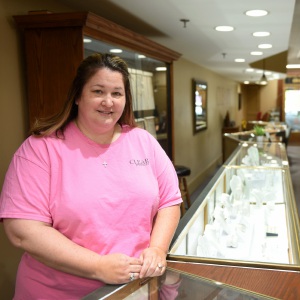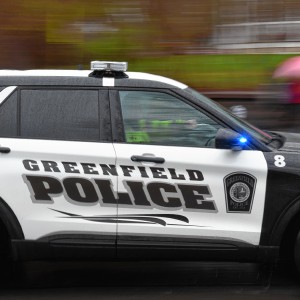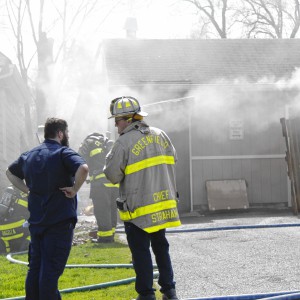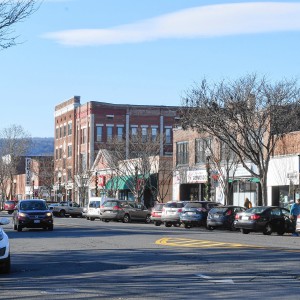Sen. Comerford, local residents urge state to update outdated mosquito-control plan
| Published: 05-12-2023 10:14 AM |
NORTHAMPTON — A panel known as the Select Committee on Pesticide Reduction in 2019 issued a report to the Northampton City Council urging municipal leaders to consider eliminating the use of pesticides.
“If deemed absolutely necessary, any pesticide should be applied with utmost care in a manner that provides maximum protection of the public,” reads the concluding line of the introduction to the 38-page report that came out from a resolution co-sponsored by former City Councilor Alisa Klein as a way to confront health problems associated with human exposure, a decline of pollinators and birds and a possible link to climate change.
For Adele Franks, who chaired that select committee, the state needs to adopt policies and regulations that similarly promote safety for the public and the larger environment, especially as it comes to protecting health in dealing with the mosquito population.
“Mosquito control policies in Massachusetts are outrageously outdated and not in sync with current science,” Franks said at a Joint Committee on Environment and Natural Resources hearing this week.
Franks was speaking in favor of “an act establishing an ecologically-based mosquito management program in the commonwealth to protect public health,” bills filed in the Senate by Sen. Jo Comerford, D-Northampton, and in the House by Rep. Kathleen LaNatra, D-Kingston.
At the hearing on Wednesday, chaired by Rep. Daniel Cahill, D-Lynn, and Sen. Becca Rausch, D-Needham, held both at the State House and in virtual format, numerous people offered input on the mosquito-related bills, as well as others aimed at better controlling pesticides and protecting pollinators.
Comerford told the panel there is a need to modernize and update the mosquito-control rules that date to 1918. The senator called for a 21st-century mosquito plan, observing that she is hearing from cities and towns that they need to be given tools to protect health in a modern way, rather than through techniques such as spraying that is outdated and expensive and not scientifically based.
“And it isn’t effective at controlling mosquitos,” Comerford said.
Article continues after...
Yesterday's Most Read Articles
 Orange man gets 12 to 14 years for child rape
Orange man gets 12 to 14 years for child rape
 Cleary Jewelers plans to retain shop at former Wilson’s building until 2029
Cleary Jewelers plans to retain shop at former Wilson’s building until 2029
 Greenfield Police Logs: April 2 to April 8, 2024
Greenfield Police Logs: April 2 to April 8, 2024
 Fire scorches garage on Homestead Avenue in Greenfield
Fire scorches garage on Homestead Avenue in Greenfield
 One Greenfield home invasion defendant up for bail, other three held
One Greenfield home invasion defendant up for bail, other three held
 Two local school advocates tapped to lead state’s new Small and Rural Schools Committee
Two local school advocates tapped to lead state’s new Small and Rural Schools Committee
Comerford pointed to the temporary law that led to the The Mosquito Control for the Twenty-First Century task force recommending a complete overhaul of what is on the books. Her bill draws on these recommendations.
An outline distributed by Comerford’s office states that the existing mosquito management system “is woefully out of date, fragmented, does not reflect current scientific understanding, and provides no opportunity for public input.”
The bill would also prohibit all aerial spraying and ban pesticides containing PFAS. The bill also allows residents to opt out of spraying, with beekeepers and organic farmers opted-out by default.
Comerford’s bill has the backing of members of the MASSQuito Coalition, a group of organizations that include the Massachusetts Sierra Club and the Conservation Law Foundation.
Dorothy “Dot” McGlincy, executive director of the Massachusetts Association of Conservation Commission, endorsed what is in the bill. “We need a reboot, an update, to establish an ecologically sound mosquito management for the 21st century,” McGlincy said.
Others who attended the hearing talked about other bills, referencing the need to better control rodenticides after MK, a bald eagle that made its home in the Mystic River Watershed in Arlington, as well as four owls, died from ingesting the poison.
Laura Kiesel, an Arlington-based wildlife biologist and environmental activist, said MK’s death should spur the Legislature to give more power to cities and towns to ban pesticides, a sentiment shared by Tanya Costigan of Westfield, who noted she wants to protect the watershed and other areas in her community, though legislators have not signed onto those bills.
The idea of giving municipalities more discretion has already happened in Warwick in Franklin County, where glyphosate and Agent Orange are banned, with one person testifying that sometimes communities can be ahead of federal and state regulations.
David Melly, legislative director for the Environmental League of Massachusetts, advocated for adopting a bill filed by Rep. Mindy Domb, D-Amherst, to establish a pesticide control modernization and environmental protection task force.
While many of those who spoke appealed for the legislation to become law, one who didn’t was Nicholas John, deputy executive director of the Massachusetts Farm Bureau Federation. John said cities and towns don’t have the expertise to properly regulate pesticides, adding that it’s not a good idea to empower them on this front, as this would create an uneven patchwork of rules across the state and complicate the lives of farmers.
Carole Horowitz of Northampton, who is a member of Climate Action Now Western Mass, said she has long been concerned about pesticides and dismayed by the Legislature’s failure to act. “Pesticides pose a significant threat to life on earth, including posing a threat to our food chain,” Horowitz said.
Lenore Bryck of Amherst said the Legislature needs to step up and pass several of the proposed bills, and stop kicking the can down the road.
“Our laws can’t break natural law,” Bryck said. “We have to be in sync with the creation we are part of.”
Scott Merzbach can be reached at smerzbach@gazettenet.com.
 Greenfield City Council approves borrowing $1.18M for Main Street redesign, sewer repairs
Greenfield City Council approves borrowing $1.18M for Main Street redesign, sewer repairs New owners look to build on Thomas Memorial Golf & Country Club’s strengths
New owners look to build on Thomas Memorial Golf & Country Club’s strengths Gun buyback event collects 195 unwanted firearms
Gun buyback event collects 195 unwanted firearms Quabbin region studied for MWRA expansion
Quabbin region studied for MWRA expansion
